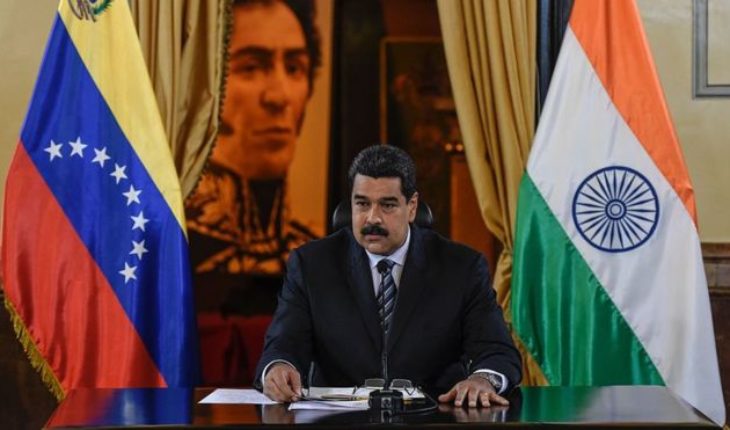Venezuela has proven reserves of oil plus g Of the world, but it is increasingly struggling to sell it.
And everything indicates that it will become more difficult: on May 24, the Ambassador of India in the United States, Harsh Vardhan Shringla, reported in a meeting with journalists that his country had stopped the purchase of Venezuelan crude.
The South American country has been recording for three years a sustained fall in the production of crude oil that has gone from 2.4 million of barrels per day in December 2015 to 830,000 barrels a day last April.
This figure is the lowest since January 2003, when in the Venezuelan state oil company, PDVSA, there was an unprecedented strike in which thousands of workers who opposed the then President Hugo Chávez participated.
Since last January the United States decided to sanction the government of President Nicholas Maduro with the suspension of the payment of crude sales-which in practice is tantamount to the stagnation of oil imports-Venezuelan production has fallen into Nearly 400,000 barrels a day, according to figures from the U.S. Energy Information Agency.
The White House measure meant a strong blow to the finances of the Venezuelan government, as the United States was at the time the main buyer of the crude oil and its largest source of cash currencies.
“Before the sanctions, between 40% and 50% of Venezuelan oil went to the U.S. and the rest was mainly for India and China, which mattered a little more than 20% each,” said Hari Seshasayee, analyst at the Wilson Center, BBC Mundo.
Washington’s decision gave India a position of great relevance to the Venezuelan economy by turning it into the first buyer of its crude oil.
Considering the large needs of imported energy that India’s economy has, initially analysts contemplated the possibility that this Asian giant could absorb the nearly 500,000 barrels a day that Washington bought from Caracas.
That hypothesis, however, was soon dismissed and now, following the announcement by the Indian ambassador in Washington, what appears to be on the table is the closure of India’s market to Venezuelan crude.
Stopping the flow
The energy link between Venezuela and India was established around 2005, when then-President Chávez signed with the Asian country a cooperation agreement in that sector that envisaged joint projects of exploration and oil exploitation in the country South american.
It was also at that time when the Venezuelan crude began to flow in the direction of India through two companies Reliance Industries and Essar, this last company was acquired by the Russian company Rosneft in 2017 and renamed as Nayara Energy.
According to data from the Embassy of India in Caracas, oil exports to that country reached its zenith in 2013-2014, when they represented annual sales of US $14 billion.
However, since the announcement of US sanctions the export of Venezuelan crude to India instead of increasing has faced increasing difficulties.
Last March, Reliance openly dismissed the possibility of increasing Venezuelan oil purchases.
The announcement came shortly after US secretary of State Mike Pompeo met with India’s foreign secretary, Vijay Gokhale, to ask that his country not be “the economic lifeline of the mature regime.”
“Our subsidiary in the U.S. has completely stopped all business with Venezuelan state oil company, PDVSA, and its global matrix has not increased purchases,” said a spokesman for the Indian company in an email sent to the news agency AFP.
Reliance also reported that it had suspended the sale to PDVSA of the diluent that this company requires to be able to market the extra-heavy crude, which forms the majority of the reserves of Venezuela.
Later, last April, the Indian company disclosed a press release in which it denied that it was participating in a scheme to pay through third-party oil purchases to PDVSA.
Reliance explained that since before the imposition of U.S. restrictions bought Venezuelan crude to companies like Rosneft, which are entitled to receive oil from that country as part of a scheme for the payment of an existing debt.
“Since the sanctions were imposed, Reliance has made those purchases with the full knowledge and approval of the U.S. Department of States and Reliance has informed you specifically about transactions and volumes. These transactions do not lead to any payment to PDVSA and do not violate U.S. sanctions and policies, “he said.
Free fall
However, the biggest blow to the prospects of selling Venezuelan oil to India came last week, when Ambassador Harsh Vardhan Shringla, in a meeting with journalists to discuss the electoral victory of Prime Minister Narendra Modi, said that his country He had suspended the purchase of Venezuelan crude. The same meeting announced the cessation of crude imports from Iran.
The diplomat, however, did not clarify whether he referred to all the import of crude oil from Venezuela (including the one purchased through Rosneft) or not.
In any case, companies specializing in monitoring the global transport of oil by sea as ClipperData have published information according to which, at least until last April, Venezuelan crude was still transported to China, India and Some European countries.
Hari Seshasayee explained to BBC Mundo that when Washington announced the sanctions against Venezuela, Reliance negotiated with the US authorities a gradual reduction rather than an immediate freeze on Venezuelan oil imports.
“I believe that this reduction may already have occurred,” said Seshasayee, who noted that Reliance was the Indian company that bought the largest amount of Venezuelan crude, importing between 80% and 90% of all Venezuelan oil entering the country.
According to ClipperData, Venezuelan oil exports to India averaged 300,000 barrels per day in 2018.
But what would it mean for Venezuela to cease its oil exports to India?
“It would be a very big impact. After the sanctions, India became the first Venezuelan oil buyer, “says Seshasayee, who points out that while sales to India are a source of fresh money for Venezuela, most of the crude shipped to China is used to pay debts Previously contracted with Beijing.
Matt Smith, ClipperData’s director of raw materials Research, agrees that India’s suspension of crude oil purchases would have a noticeable impact.
“If they stop buying it, it seems unlikely they will be able to place it somewhere else,” he says.
“Venezuela’s economy is already in freefall, so the loss of India as a destination for its crude oil would only increase the agony,” he warns.





